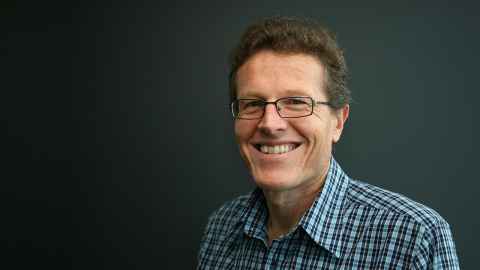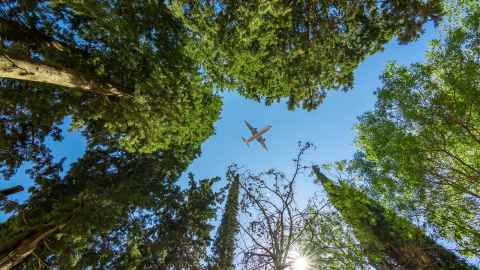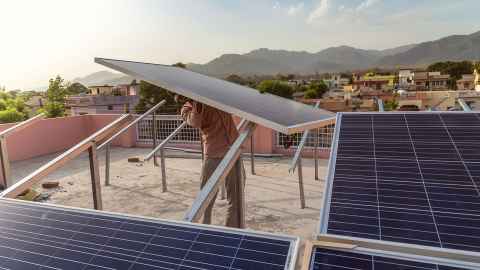How to up the trust in sustainability reporting
7 July 2022
Transparent reporting on SDGs is problematic, but a recent framework can help businesses harness the internet of things and blockchain to improve outcomes.

As pandemic restrictions ease and more people take to the skies, questions around carbon offsetting are also taking off.
So how does a (very excited, travel-deprived, climate-change conscious) passenger verify exactly where their carbon-offset payment is going and how it's being used?
Currently this is difficult, but researchers from the University of Auckland and the University of South Australia say that by harnessing blockchain and the internet of things (IoT), businesses, like airlines, can improve their sustainability information gathering and reporting, making it more transparent and accessible.
“In our research paper, we outline the business opportunity for enterprises to provide measurement technology, linked to the internet of things, which feeds information into a blockchain, providing reliable and trusted data and an incentive for other parties around the globe to contribute towards progress on the Sustainable Development Goals (SDGs),” says University of Auckland Professor of Accounting Charl de Villiers.

Progress on the 17 interlinked United Nations' SDGs, which are an urgent call for action by all countries, has been hampered by a lack of proper measurement of the sustainable development goal indicators and a lack of trust in the measurements performed by others, says de Villiers.
For example, vast sums of money are transferred from developed to developing nations each year to support various SDG-related projects, such as carbon offset schemes. Yet, there is a lack of trust in measurements performed in developing countries due to corruption and weak governance.
"Companies often use a sticker approach when it comes to SDGs,” says de Villiers. “They have their annual report and look at where they can add stickers or icons to show that they're doing something, but a lot of the time it can't be exactly verified, so there’s this lack of public trust in the reporting of sustainability-related goals and targets."
To tackle this issue, Professor de Villiers and University of South Australia academics Dr Sanjaya Kuruppu and Dr Dinithi Dissanayake produced a conceptual framework to help start-up firms and existing businesses better understand how they can engage the internet of things and blockchain technology to improve their sustainability and reporting, and to help spur innovation.

"Capturing, managing, and reporting on sustainability information is very problematic for organisations, so one way of addressing this is to give them tools, which will make it easier to record minute data in real time from different parts of their production processes or supply chains through IoT devices," says Dr Kuruppu.
The internet of things is essentially different internet-connected devices, such as temperature sensors or radio frequency identification tags, that can capture, record, and transmit data. These devices can feed real-time information into a blockchain platform that acts as a ledger to capture that data and report it to organisations and interested stakeholders, such as airline passengers.
"For example," says Kuruppu, "Qantas might currently find it difficult to verify exactly where the extra fee they're collecting from their carbon-offset programme is going and the emissions they're actually reducing as a result."
However, to improve the trust and transparency of their carbon offset scheme, this additional fee could be registered on a blockchain as a credit token, says Kuruppu.
“When sufficient credits are received, a smart contract can transfer these credit tokens to fund a village or neighbourhood solar offset project run by a start-up company or a non-governmental organisation operating in a developing country.”
Because the use of fires for heating and cooking cause significant carbon emissions and other negative environmental consequences in many small villages in developing nations, de Villiers says a solar project could reduce the need for firewood and carbon emissions for heating and cooking.

Such a project, through start-ups or NGOs in developing countries, could install solar panels on roofs in a neighbourhood and set up the infrastructure required, such as IoT sensors on solar panels.
These sensors could capture how much electricity is generated by each panel and how much energy is transmitted between the households in that particular community. This data can then be uploaded to a blockchain, where it's transparent and immutable, he says.
In doing so, a business such as Qantas could show that it reduced carbon emissions in a particular village by a specific amount, and in a particular timeframe, therefore creating trust in its reporting of such numbers.
Utilising IoT and blockchain in this way can create a level of traceability regarding sustainability information that doesn't really exist, says Kuruppu, especially with the current state of legacy finance and accounting systems that a lot of organisations have.
"They're unable to capture data in real time like our proposed system could, and they don't have an efficient way of distributing that information to lots of stakeholders like the tens of thousands of customers that might want to log in and check where their carbon offset money went."
Read the full paper: A (New) Role for Business – Promoting the United Nations’ Sustainable Development Goals Through the Internet-of-Things and Blockchain Technology.
Media contact
Sophie Boladeras | Media adviser
M: 022 4600 388
E: sophie.boladeras@auckland.ac.nz